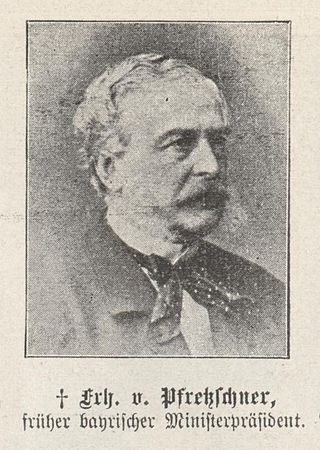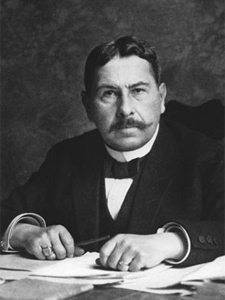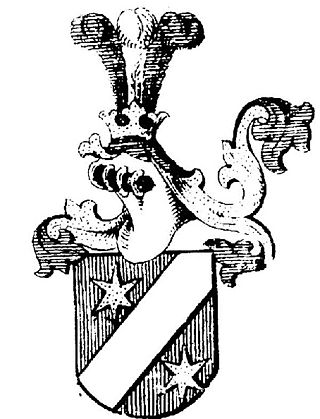
Bavaria, officially the Free State of Bavaria, is a state in the south-east of Germany. With an area of 70,550.19 km2 (27,239.58 sq mi), Bavaria is the largest German state by land area, comprising roughly a fifth of the total land area of Germany. With over 13 million inhabitants, it is the second largest German state in terms of population only to North Rhine-Westphalia, but due to its large size its population density is below the German average. Bavaria's main cities are Munich, Nuremberg, and Augsburg.

Bamberg is a town in Upper Franconia, Germany, on the river Regnitz close to its confluence with the river Main. The town dates back to the 9th century, when its name was derived from the nearby Babenberch castle. Cited as one of Germany's most beautiful towns, with medieval streets and Europe's largest intact old city wall, the old town of Bamberg has been a UNESCO World Heritage Site since 1993.

Franconia is a region of Germany, characterised by its culture and Franconian dialect.

Ludwig I or Louis I was King of Bavaria from 1825 until the 1848 revolutions in the German states. When he was crown prince, he was involved in the Napoleonic Wars. As king, he encouraged Bavaria's industrialization, initiating the Ludwig Canal between the rivers Main and the Danube. In 1835, the first German railway was constructed in his domain, between the cities of Fürth and Nuremberg, with his Bavaria joining the Zollverein economic union in 1834. After the July Revolution of 1830 in France, Ludwig's previous liberal policy became increasingly repressive, in 1844, Ludwig was confronted during the Beer riots in Bavaria. During the revolutions of 1848 the king faced increasing protests and demonstrations by students and the middle classes. On 20 March 1848, he abdicated in favour of his eldest son, Maximilian.

Bavarians are a Germanic people who are native to the region of Bavaria, a state within Germany. The group's dialect or speech is known as the Bavarian language, native to Altbayern, roughly the territory of the Electorate of Bavaria in the 17th century.
Geheimrat was the title of the highest advising officials at the Imperial, royal or princely courts of the Holy Roman Empire, who jointly formed the Geheimer Rat reporting to the ruler. The term remained in use during subsequent monarchic reigns in German-speaking areas of Europe until the end of the First World War. At its origin the literal meaning of the word in German was 'trusted advisor' - the word "geheim" (secret) implying that such an advisor could be trusted with the Monarch's secrets. The English-language equivalent is Privy Councillor.

Adolf Freiherr von Pfretzschner was a Bavarian politician.

Gustav Ritter von Kahr was a German jurist and right-wing politician. During his career he was he was district president of Upper Bavaria, Bavarian minister president and, from September 1923 to February 1924, Bavarian state commissioner general with dictatorial powers. In that role he openly opposed the government of the Weimar Republic in several instances, including by ceasing to enforce the Law for the Protection of the Republic. He was also making plans with General Otto von Lossow and Bavarian police commander Hans von Seisser to topple the Reich government in Berlin. In November 1923, before they could act, Adolf Hitler instigated the Beer Hall Putsch. The three turned against Hitler and helped stop the attempted coup. After being forced to resign as state commissioner general in 1924, Kahr served as president of the Bavarian Administrative Court until 1930. Because of his actions during the Beer Hall Putsch, he was murdered during the Nazi purge known as the Night of the Long Knives in June 1934.

The Kingdom of Bavaria was a German state that succeeded the former Electorate of Bavaria in 1805 and continued to exist until 1918. With the unification of Germany into the German Empire in 1871, the kingdom became a federated state of the new empire and was second in size, power, and wealth only to the leading state, the Kingdom of Prussia.

Ignaz Ritter von Rudhart was a Bavarian scholar and public servant who was dispatched to Greece to serve as President of the Privy Council during the reign of King Otto.

Jakob Ritter von Danner was a Bavarian general in the Imperial German Army and the Reichswehr. As commandant of the Munich garrison of the Reichswehr, he was a central figure in putting down the attempted Beer Hall Putsch by Adolf Hitler and the Nazis in 1923.

The Military Order of Max Joseph was the highest military order of the Kingdom of Bavaria. It was founded on 1 January 1806 by Maximilian I Joseph of Bavaria, the first king of Bavaria. The order came in three classes:

Prince Karl Theodor Maximilian August of Bavaria ; and grand prior of the order of Malta, was a German soldier.

August Ritter von Clemm was a German businessman and politician.

Weber is the surname of an aristocratic German Catholic family from Bavaria. Originating in Upper Franconia, the male line originates with Friedrich Weber, huntsman of the Prince Bishop of Bamberg, as well as mayor of Marktleugast.

The Order of Merit of the Bavarian Crown was an order of merit of the Kingdom of Bavaria established by King Maximilian Joseph I on 19 March 1808. The motto of the order is Virtus et Honos.

Counts of Luxburg in the 18th Century also the family Girtanner of Luxburg, is originally the name of a St. Galler Council member that immigrated from Girtannerhof in the canton of Appenzell. The family became a Bavarian noble family in 1813. Documentary records appear for the first time under the name Girtanner in the year in 1386.

Josef Ritter von Schmitt was a Bavarian politician and prominent jurist, who served as the 14th President of Upper Franconia from the turn of the century until his death in 1907.

Josef Schmitt, later Ritter Josef Schmitt was a German Lawyer, Knight, and Privy Councilor. He was born in Bavaria to Ritter Josef von Schmitt, who was the advisor to Prince Luitpold of Bavaria and a privy councilor. Josef Schmitt was, in later life, Deputy Chairman of the Supervisory Board of SKF, the J. Mich AG in Bamberg, the AG Steinfels, formerly Hch. Knab in Steinfels, the H. Henniger Reifbräu AG in Erlangen and the Baumwollindustrie Erlangen-Bamberg AG in Erlangen. He was also a member of the supervisory boards of the AG für Licht- und Kraftversorgung in Munich, the Porzellanfabrik Kloster Veilsdorf AG , the porcelain manufacturer C. M. Hutschenreuther AG in Altrohlau and the Rizzibräu AG in Kulmbach. He was a member of the Bavarian State Committee of Deutsche Bank and Disconto-Gesellschaft and the Allianz and Stuttgarter Verein Versicherungs-AG, later Allianz.

The House of Poschinger is an ancient Bavarian noble family. It traces its origins back to 1140. The family received the rank of Knights of the Holy Roman Empire. The Frauenau branch rose to the rank of Barons (Freiherr) in the Kingdom of Bavaria and held a hereditary seat in the House of Councillors.





















